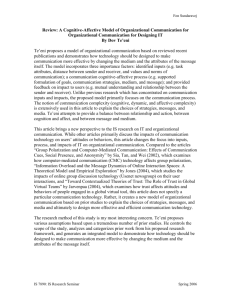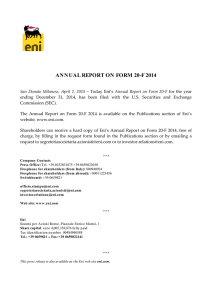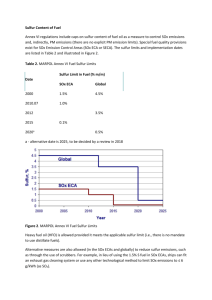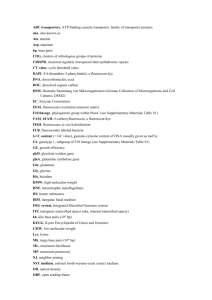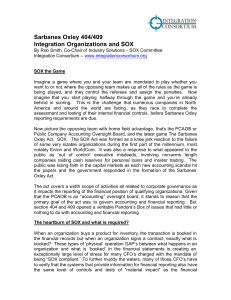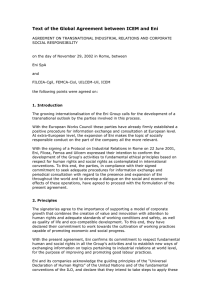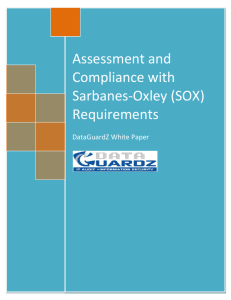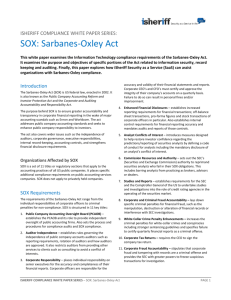In linea con le politiche ambientali dell`Unione Europea è stato
advertisement
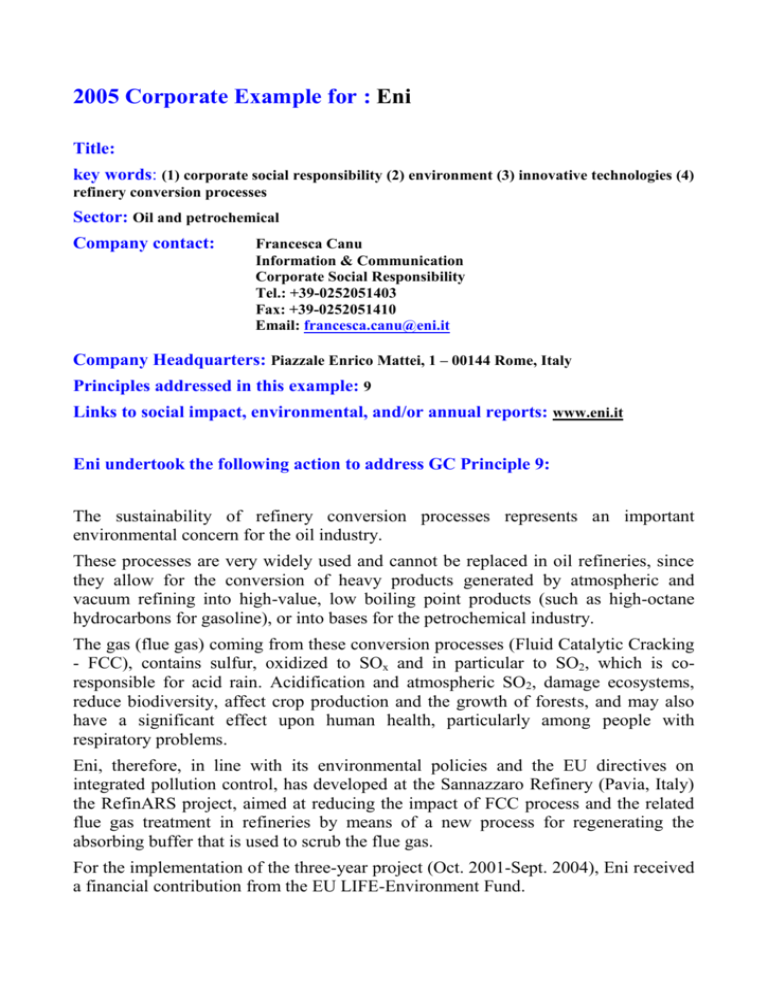
2005 Corporate Example for : Eni Title: key words: (1) corporate social responsibility (2) environment (3) innovative technologies (4) refinery conversion processes Sector: Oil and petrochemical Company contact: Francesca Canu Information & Communication Corporate Social Responsibility Tel.: +39-0252051403 Fax: +39-0252051410 Email: francesca.canu@eni.it Company Headquarters: Piazzale Enrico Mattei, 1 – 00144 Rome, Italy Principles addressed in this example: 9 Links to social impact, environmental, and/or annual reports: www.eni.it Eni undertook the following action to address GC Principle 9: The sustainability of refinery conversion processes represents an important environmental concern for the oil industry. These processes are very widely used and cannot be replaced in oil refineries, since they allow for the conversion of heavy products generated by atmospheric and vacuum refining into high-value, low boiling point products (such as high-octane hydrocarbons for gasoline), or into bases for the petrochemical industry. The gas (flue gas) coming from these conversion processes (Fluid Catalytic Cracking - FCC), contains sulfur, oxidized to SOx and in particular to SO2, which is coresponsible for acid rain. Acidification and atmospheric SO2, damage ecosystems, reduce biodiversity, affect crop production and the growth of forests, and may also have a significant effect upon human health, particularly among people with respiratory problems. Eni, therefore, in line with its environmental policies and the EU directives on integrated pollution control, has developed at the Sannazzaro Refinery (Pavia, Italy) the RefinARS project, aimed at reducing the impact of FCC process and the related flue gas treatment in refineries by means of a new process for regenerating the absorbing buffer that is used to scrub the flue gas. For the implementation of the three-year project (Oct. 2001-Sept. 2004), Eni received a financial contribution from the EU LIFE-Environment Fund. Outcome The main goal of the RefinARS project was to demonstrate the feasibility of an innovative technology for the flue gas desulphurization by using a regenerative absorbing buffer, which allows the sulfur recovery. For this purpose a plant to regenerate the buffer solution was realized. After the testing activities, a technical and economical comparison with the best available technologies (BAT) relevant to the sector was carried out, as well as an analysis of the overall environmental impact. The project had a direct bearing on 54 cracking plants and 49 sulfur recovery plants throughout the EU and can be applied to other industrial productions. For this reason a dissemination program was conducted during the whole length of the project to reach potential interested parties at a local, national and international level, such as public administrations, institutions, environment control authorities and industries of the sector. The dissemination included targeted information, web pages, publications and meeting-seminar events. A series of environmental targets were reached during the test campaigns and 2005 unit run, namely: High SOx removal efficiency, since SOx concentration at FCC stack outlet is lower than 250 mg/Nmc (referred to a 208000 Nmc/hr gas flow with an inlet of 1700 mg/Nmc SOx) Recovery of saleable sulfur from the gaseous SOx rich stream produced by the buffer regeneration process; No impact on soil, being negligible the quantity of solid waste to be land-filled (less than 500 kg/d); No impact on transportation of solid waste generated by the SOx absorption reactions; Very low impact on water, as the liquid effluents from the process are very low (less than 1 mc/hr) In addition to the environmental achievements, operating costs were significantly reduced, if compared with the BAT, in terms of chemicals consumption and energy requirements.
